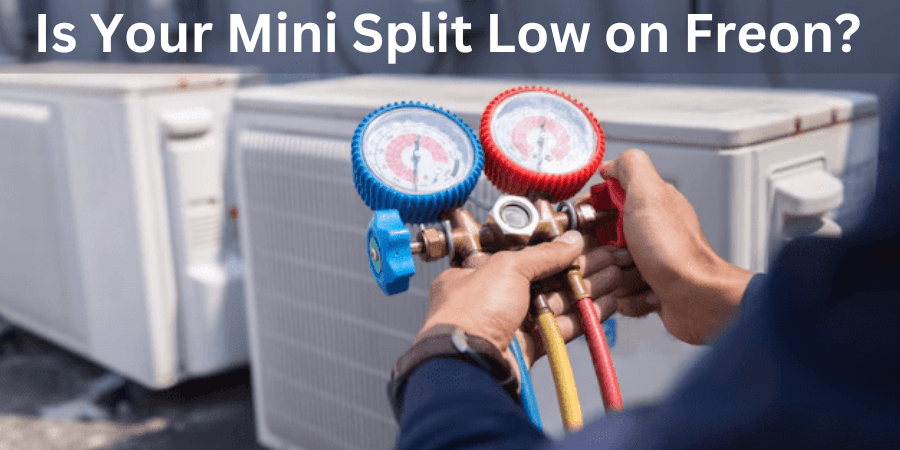When your mini-split is not cooling your rooms adequately, it could indicate a freon leak. Ensuring that your unit is charged with the right amount of refrigerant is vital for its optimal performance.
Freon is a non-combustible gas used as a refrigerant in air conditioning systems. It continuously evaporates and condenses to produce cool air, which is then circulated throughout your AC system.
Is Mini Split is Low on Freon? – Short Answer
Regular maintenance is essential to prevent these issues. If you notice any of these symptoms, contact a professional technician to inspect and repair your system promptly to ensure it runs efficiently.
Here’s how to determine if your mini-split needs a freon top-up
First, check the air temperature entering the evaporator coil and the Delta T (the difference in degrees between the indoor air and the coil). If this temperature difference is lower than usual, your system might be low on freon.
Listen to the compressor: if it sounds different or is constantly running, it might be struggling due to a lack of freon. Also, inspect the condensing coil.

If it’s saturated with ice, it’s a clear sign of a problem. Finally, always ensure proper maintenance to protect your mini-split from disrepair and costly repairs. Regular checks by a technician can offer practical solutions and help remove any worry about freon levels.
Can you determine how much Freon is left in your mini split? Absolutely, let’s explore how.
Leaking
I’ve noticed that when a mini split is low on Freon, it affects the entire cooling process. You might hear unusual noises or see a decline in the system’s performance. Usually you donot need a gas refill.This is often due to a refrigerant leak.
A heat pump that’s working properly should maintain its refrigerant levels, but small leaks at main connector points can cause problems.
Check for oil stains on the wall near the indoor unit or around the outdoor unit. These stains indicate potential leaks and suggest the conditioned air isn’t circulating as it should. Regularly inspecting these points can prevent low refrigerant levels and keep your system running smoothly.
Frost Accumulation
When you notice ice buildup on your mini split’s indoor unit and evaporator coil, it’s a clear problem indicating a low refrigerant level. This issue can cause limited airflow due to a clogged filter or other parts inside the system. The refrigerant helps keep the air cold, and when it’s low, it can freeze the water or condensation around the heat pump.
If you see ice on or around your system, it might mean your refrigerant is leaking and needs to be repaired. Additionally, when the outdoor compressor lacks enough refrigerant to function correctly, heat insulation can occur, causing the cool air around the condenser coils to freeze.
This combination of signs clearly shows a need to check and potentially refill your mini split’s Freon to ensure it runs efficiently.
Unpleasant smells
If you suspect your mini split is low on Freon, pay attention to any unpleasant odours that might be coming from the unit. A pungent or musty odour can be a sign of mould or fungal growth within the system. This can happen due to excessive moisture or poor maintenance.
Correcting this defect in a timely manner is important because it can affect air quality and potentially cause health problems. Ensuring the system is regularly checked and maintained can prevent such issues, keeping your air clean and healthy.
Reduced cooling power
If your mini split system isn’t cooling your home as efficiently as it used to, it might be low on Freon. When the refrigerant levels are low, the system struggles to dissipate heat. You might notice the cool air isn’t as cold, and the unit may be turning off unexpectedly. Even if there’s no water or ice around your heat pump, low Freon could still be the culprit.
Dirty filters can also affect performance, so ensure they are checked and cleaned. If you hear a hissing sound, it might indicate freon leaks. In such cases, call a technician who can inspect the system and remediate any issues.
Do Mini Splits Need Maintenance? Yes, regular maintenance is crucial. Low Freon causes the ductless mini split to work harder, which can stress the unit.
A technician can identify and fix freon leaks, ensuring your system keeps your house cool in the summer and warm in winter. If your system isn’t performing as it should, don’t delay in seeking professional help to keep your home comfortable year-round.
Shifting Temperature
If you notice parts of your room becoming warmer or colder than usual, it might indicate problems with the freon level in your mini-split system. Uneven airflow distribution is a common symptom of low freon.
When I experienced this in my own home, I had to contact a professional HVAC technician. They were able to pinpoint the problem quickly and perform the necessary repairs.

Regular maintenance is crucial to prevent these issues. If you spot any of these symptoms, make sure to reach out for expert help to keep your mini-split system running smoothly.
How often do mini splits require a Freon refill?
When considering how often mini splits require a Freon refill, it’s important to understand that the refrigerant in your HVAC system should ideally last as long as the unit itself, which is about 15 years. However, if your unit has a leak, an HVAC professional may need to add refrigerant to your mini-split after necessary repairs have been completed.
Personal experience with mini splits has shown that regular maintenance and keeping an eye on any signs of a leak can significantly extend the lifespan of the refrigerant. If you suspect your mini-split is not cooling effectively, it might be time to call in an HVAC professional to check for any leaks and ensure that the refrigerant levels are adequate.
Can Freon run low without any leaks?
Many homeowners wonder if their AC can lose or run out of freon over time. Interestingly, unless there’s a hole or crack in the compressor holding the freon, the level remains the same. An AC doesn’t require a recharge of freon without the presence of a leak.
Some homeowners also ask if they can run an AC when it is low on refrigerant. Running an AC on low refrigerant can make the compressor susceptible to damage, leaving it unable to cool a space or room effectively in the future. In many cases, running an AC on low freon can result in the unit completely breaking down.
How to spot Freon leak in a mini split?
To detect a Freon leak in a mini split system, use the right tools and methods. Electronic leak detectors are effective and specialized instruments that are sensitive enough to identify the smallest leaks.
Investing in a quality detector unit is wise or you can rent one from your local HVAC supply store. UV dye injection is another technique professionals use. By injecting a special dye into the refrigerant system, it becomes visible under UV light, showing a clear, visual indication of a leak.
For a cost-effective method, use a soap bubble solution. Apply the solution to suspected leak areas and observe the formation of bubbles to pinpoint the leak locations. Infrared cameras can detect temperature discrepancies, providing detailed images.
This data is invaluable for spotting leaks during a comprehensive inspection. Choosing the right combination of tools and techniques ensures efficient and effective leak detection.
FAQs
1. Can you check Freon level?
To check the Freon level in your mini split, turn off the air conditioner and locate the service valves. Attach the manifold gauge set to the valves, then turn on the system and observe the pressure readings. These should be between 30-40 PSI, though some systems may require higher or lower pressures. This simple check can help ensure your mini split isn’t low on Freon.
2. Does a Freon leak smell?
If you notice a sweet or chemical smell around your mini split, it could mean Freon is leaking. While inhaling small amounts isn’t harmful and won’t cause long-term health effects, a leak can damage your appliance and make it less efficient over time. Addressing these leaks early can help avoid bigger problems later.
3. Can I stay in a house with a Freon leak?
Living with a Freon leak can be risky because Freon is a dangerous gas that can cause health problems if inhaled. If you notice strange odors coming from your HVAC system, be cautious—those odors might be emanating from a leak. In this situation, avoid the area and take steps to protect yourself.
4.How to tell if AC is leaking, refrigerant or water?
f your AC unit has stopped running and water is leaking, it may mean frozen condensation on the evaporator coils is melting. Also, if you hear hissing or bubbling sounds, it often means refrigerant leaks through small holes or cracks in the coils.

